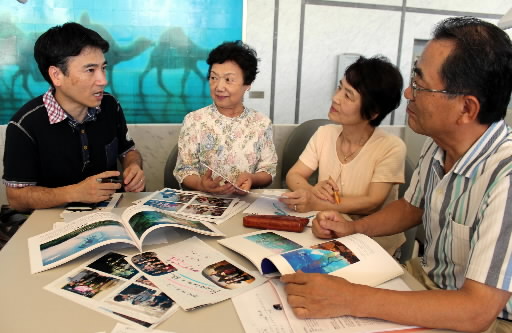A-bomb survivors to join rallies in U.K. and appeal for nuclear abolition
Sep. 5, 2012
by Sakiko Masuda, Staff Writer
Survivors of the atomic bombing of Hiroshima, along with a second-generation survivor, will take part in peace rallies to be held in London and other cities in the United Kingdom in mid-September. They will convey their A-bomb accounts and appeal for the elimination of nuclear weapons at these rallies being planned by young people in that nation.
Emiko Yamanaka, 78, a resident of Kure, Hiroshima Prefecture, was exposed to the A-bomb about 1.4 kilometers from the hypocenter. Masaru Tanaka, 43, a contemporary artist who lives in Yamagata, in northern Japan, is originally from Hiroshima and is a second-generation A-bomb survivor. They will attend peace rallies slated for London, Birmingham, and other cities on October 8, 9, and 15.
Ms. Yamanaka will speak about her experience of the bombing, and a documentary film will be screened in which Mr. Tanaka and his father, a survivor of Hiroshima, appear. Another event being organized will involve survivors and participants of the rallies making a work of art using origami paper cranes.
The idea for the rallies was inspired five years ago when Masanori Shinagawa, 71, and his wife Toshiko, 66, guided some young people from the United Kingdom when they visited Hiroshima Peace Memorial Museum. The story of their visit to Hiroshima spread by word of mouth after their return, and the couple, who serve as volunteer guides, have since guided some 20 people from the United Kingdom. This past June they were asked to take part in the peace rally effort and they readily accepted the offer, believing, “We should give our support to these young people who have come to Hiroshima to learn and think seriously about nuclear abolition.” The Shinagawa was then asked Ms. Yamanaka and others to join them.
Ms. Yamanaka said, “I would like to leave with the young people my feelings of being absolutely against nuclear weapons.” Mr. Tanaka said, “I would like the rallies to be events where people can share their feelings and have the opportunity to think.”
(Originally published on September 3, 2012)
Survivors of the atomic bombing of Hiroshima, along with a second-generation survivor, will take part in peace rallies to be held in London and other cities in the United Kingdom in mid-September. They will convey their A-bomb accounts and appeal for the elimination of nuclear weapons at these rallies being planned by young people in that nation.
Emiko Yamanaka, 78, a resident of Kure, Hiroshima Prefecture, was exposed to the A-bomb about 1.4 kilometers from the hypocenter. Masaru Tanaka, 43, a contemporary artist who lives in Yamagata, in northern Japan, is originally from Hiroshima and is a second-generation A-bomb survivor. They will attend peace rallies slated for London, Birmingham, and other cities on October 8, 9, and 15.
Ms. Yamanaka will speak about her experience of the bombing, and a documentary film will be screened in which Mr. Tanaka and his father, a survivor of Hiroshima, appear. Another event being organized will involve survivors and participants of the rallies making a work of art using origami paper cranes.
The idea for the rallies was inspired five years ago when Masanori Shinagawa, 71, and his wife Toshiko, 66, guided some young people from the United Kingdom when they visited Hiroshima Peace Memorial Museum. The story of their visit to Hiroshima spread by word of mouth after their return, and the couple, who serve as volunteer guides, have since guided some 20 people from the United Kingdom. This past June they were asked to take part in the peace rally effort and they readily accepted the offer, believing, “We should give our support to these young people who have come to Hiroshima to learn and think seriously about nuclear abolition.” The Shinagawa was then asked Ms. Yamanaka and others to join them.
Ms. Yamanaka said, “I would like to leave with the young people my feelings of being absolutely against nuclear weapons.” Mr. Tanaka said, “I would like the rallies to be events where people can share their feelings and have the opportunity to think.”
(Originally published on September 3, 2012)








